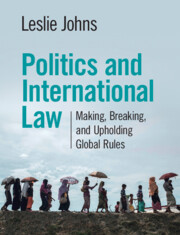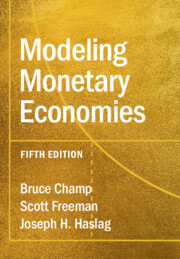Refine search
Actions for selected content:
36886 results in Cambridge Textbooks
Index
-
- Book:
- A First Course in General Relativity
- Published online:
- 02 July 2022
- Print publication:
- 30 June 2022, pp 491-498
-
- Chapter
- Export citation
5 - Preface to curvature
-
- Book:
- A First Course in General Relativity
- Published online:
- 02 July 2022
- Print publication:
- 30 June 2022, pp 111-140
-
- Chapter
- Export citation
Contents
-
- Book:
- Cosmology
- Published online:
- 07 July 2022
- Print publication:
- 30 June 2022, pp vii-xii
-
- Chapter
- Export citation

Politics and International Law
- Making, Breaking, and Upholding Global Rules
-
- Published online:
- 27 June 2022
- Print publication:
- 09 June 2022
-
- Textbook
- Export citation

Modeling Monetary Economies
-
- Published online:
- 17 June 2022
- Print publication:
- 02 June 2022
-
- Textbook
- Export citation
6 - Infinite Series
- from Part I - Things You Just Gotta’ Know
-
- Book:
- Mathematical Methods and Physical Insights
- Published online:
- 15 July 2022
- Print publication:
- 16 June 2022, pp 51-72
-
- Chapter
- Export citation
List of BTWs
-
- Book:
- Mathematical Methods and Physical Insights
- Published online:
- 15 July 2022
- Print publication:
- 16 June 2022, pp xiv-xvi
-
- Chapter
- Export citation
9 - The Dirac Delta Function
- from Part I - Things You Just Gotta’ Know
-
- Book:
- Mathematical Methods and Physical Insights
- Published online:
- 15 July 2022
- Print publication:
- 16 June 2022, pp 105-116
-
- Chapter
- Export citation
37 - Coda: Of Time Intervals and Frequency Bands
- from Part V - Orthogonal Functions
-
- Book:
- Mathematical Methods and Physical Insights
- Published online:
- 15 July 2022
- Print publication:
- 16 June 2022, pp 604-612
-
- Chapter
- Export citation
34 - Convergence and Completeness
- from Part V - Orthogonal Functions
-
- Book:
- Mathematical Methods and Physical Insights
- Published online:
- 15 July 2022
- Print publication:
- 16 June 2022, pp 537-549
-
- Chapter
- Export citation
Part V - Orthogonal Functions
-
- Book:
- Mathematical Methods and Physical Insights
- Published online:
- 15 July 2022
- Print publication:
- 16 June 2022, pp 501-502
-
- Chapter
- Export citation
24 - Vector Space
- from Part IV - Linear Algebra
-
- Book:
- Mathematical Methods and Physical Insights
- Published online:
- 15 July 2022
- Print publication:
- 16 June 2022, pp 328-339
-
- Chapter
- Export citation
16 - Mostly Maxwell
- from Part II - The Calculus of Vector Fields
-
- Book:
- Mathematical Methods and Physical Insights
- Published online:
- 15 July 2022
- Print publication:
- 16 June 2022, pp 218-227
-
- Chapter
- Export citation
19 - Series, Singularities, and Branches
- from Part III - Calculus in the Complex Plane
-
- Book:
- Mathematical Methods and Physical Insights
- Published online:
- 15 July 2022
- Print publication:
- 16 June 2022, pp 248-268
-
- Chapter
- Export citation
Curvilinear Coordinates
-
- Book:
- Mathematical Methods and Physical Insights
- Published online:
- 15 July 2022
- Print publication:
- 16 June 2022, pp 729-732
-
- Chapter
- Export citation
The Bessel Family of Functions
-
- Book:
- Mathematical Methods and Physical Insights
- Published online:
- 15 July 2022
- Print publication:
- 16 June 2022, pp 746-756
-
- Chapter
- Export citation
7 - Interlude: Orbits in a Central Potential
- from Part I - Things You Just Gotta’ Know
-
- Book:
- Mathematical Methods and Physical Insights
- Published online:
- 15 July 2022
- Print publication:
- 16 June 2022, pp 73-79
-
- Chapter
- Export citation
Contents
-
- Book:
- Mathematical Methods and Physical Insights
- Published online:
- 15 July 2022
- Print publication:
- 16 June 2022, pp vii-xiii
-
- Chapter
- Export citation
23 - Prelude: Superposition
- from Part IV - Linear Algebra
-
- Book:
- Mathematical Methods and Physical Insights
- Published online:
- 15 July 2022
- Print publication:
- 16 June 2022, pp 325-327
-
- Chapter
- Export citation
25 - The Inner Product
- from Part IV - Linear Algebra
-
- Book:
- Mathematical Methods and Physical Insights
- Published online:
- 15 July 2022
- Print publication:
- 16 June 2022, pp 340-367
-
- Chapter
- Export citation
